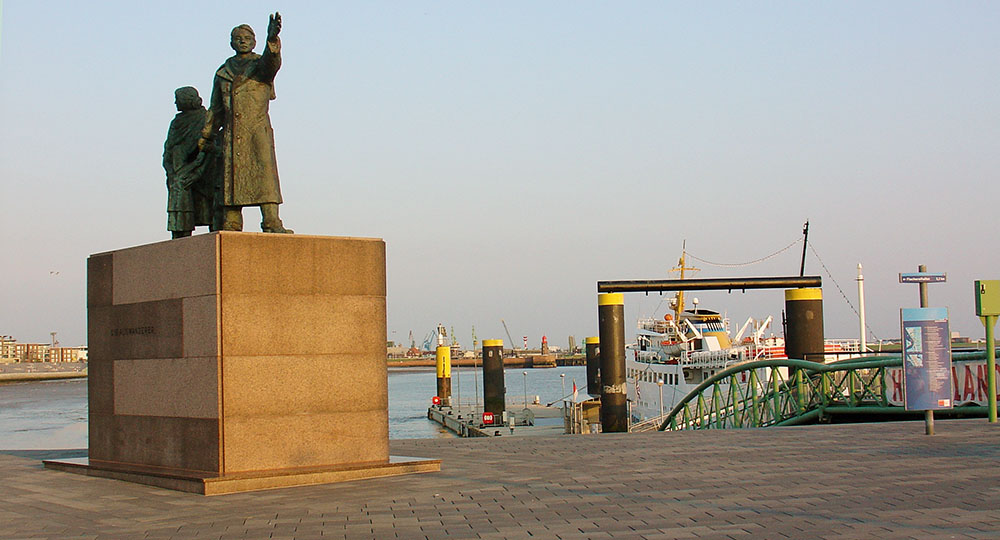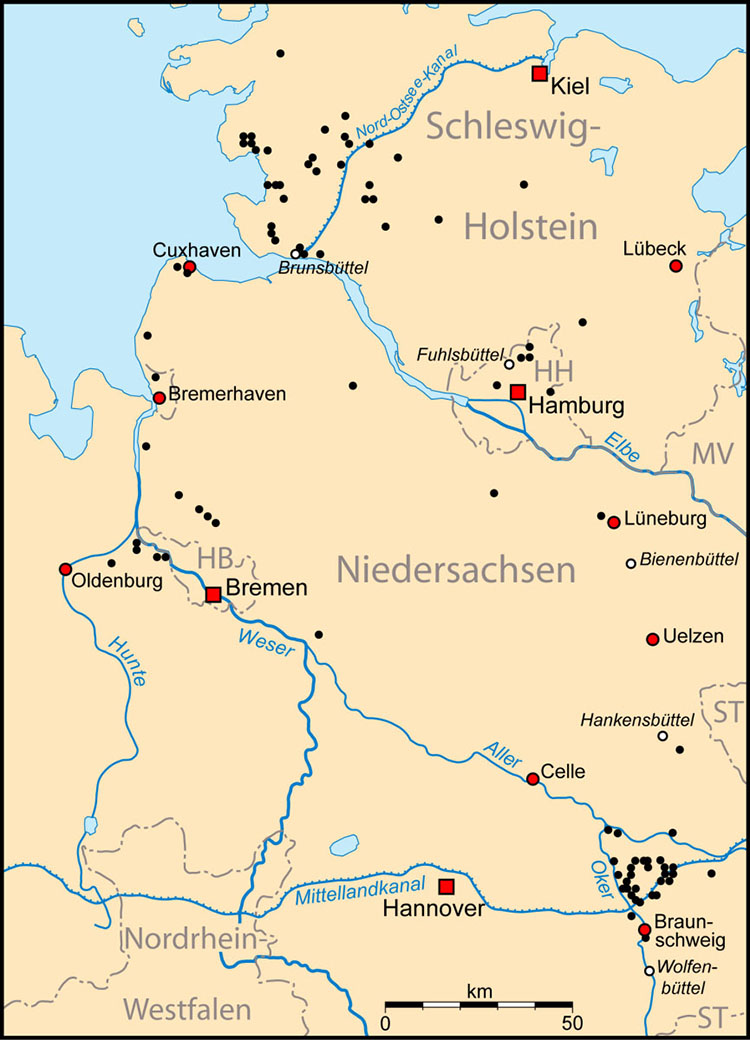|
Bosenbüttel: Zwischen Bremerhaven und Cuxhaven
The archives have no information about Fritz Mueller’s ownership of the Bosenbüttel estate — whether he owned it outright or was paying off a mortgage, for example. Selling Bosenbüttel, however, allowed Fritz to secure first-cabin passage to New York for himself, his wife Johanne, and their nine children, to travel by rail from New York City to the Midwest, and to settle the family on 600 acres of prime farmland just outside Kendallville, Indiana.
In July 2015, the 150th anniversary year of Fritz’s sale of Bosenbüttel and departure for America, Mark Nickel and Allison McMillan rented a car in Bremen, Germany, and drove through Bremerhaven, Dorum, Midlum, and Hamburg to Berlin, stopping for a serendipitous encounter with the current owners of Bosenbüttel on Saturday, July 4. The following is based on their emails to friends and family.
Driving northeast from Bremerhaven toward Cuxhaven is very much like driving through rural southern Minnesota: Acres and acres of verdant farmland, well-maintained roads, neatly laid out small towns, well-kept buildings.
It has long been so. According to one history, what is now the German northeast has hosted Büttels — small circular villages designed for self-defense — since at least the sixth century, perhaps since Roman times. Settlements like Bosenbüttel, near the North Sea, thrived on farming and fishing. There were likely hundreds of Büttels, many of which survive as place names (Fuhlsbüttel, Wolfenbüttel, Bienenbüttel — 222 of them in one recent list).
The Bosenbüttel that Fritz sold in 1865 was an extensive estate. In addition to the farmland and dairy operation, it included a sawmill, a smokehouse, a brick factory, barns, bins, and other buildings. Those structures are long gone.
 Auswanderern Denkmal, Bremerhaven Fritz Mueller and his family said their farewells and boarded the immigrant sailing ship Der Adler near where a memorial to emigrants now stands. City and provincial borders for Bremerhaven and Geestemünde were somewhat fluid in the 19th century. We spent the night of July 3 in Bremerhaven. Bremerhaven has little to recommend it except for lovers of unimaginably enormous structural steel equipment. Many dozens of cranes for unloading ocean-going ships line the waterfront, which is very active. Our hotel was right on the waterfront, very close to the Deutsches Auswandererhaus (Museum of Emigration), likely near the spot where Fritz and family boarded Der Adler.
On the morning of July 4, we drove to Dorum and stopped at the Lutheran church. It was closed until the mid-afternoon, so we couldn’t get inside. We looked around at the graves and found a few more recent Müllers. Mark struck up a conversation auf Deutsch with an older woman who was planting flowers on a well-tended grave. All the graves date from after Fritz left.
On a whim, we punched “Bosenbüttel” into the navigation system of our rented Audi and were stunned to learn that the car knew where it was. We followed the mechanical voice’s instructions (in English fortunately) and soon heard that the destination — the ancestral farm — was on our right. It was hard to know which buildings were Bosenbüttel. We were reluctant to ring doorbells, so we continued a couple hundred yards and found two huge dairy barns with maybe 60 Holsteins each and more in pasture. It had exactly the look and feel of rural southern Minnesota but without any people. We drove on, then turned around and headed back.
This time there was a farmer-looking guy in green overalls wallking near the brick barn. Mark stopped the car, hailed him with his “Verzeihung” routine, got his attention, and launched into some basic conversation: Zweimal Ur-Großvater. ... Er besitzt den ganzen Bosenbüttel um 1860. Am fünftzehnten Juli 1865 hat er alles verkauft und wandert nach America mit seiner Weib und neun Kinder aus. The man asked, “Heißt er Fritz?” (“Did they call him Fritz?”) and Mark knew he’d found his man. [Germans, Mark later learned, would never say “Zweimal Ur-.” It’s always “Ur-Ur-Grosvater.” And “Weib” is now apparently a sexist insult; it’s always “Frau.”]
 Büttels More than 200 placenames in northern Germany end in -büttel. Bosenbüttel is the second dot above Bremerhaven, nearly halfway to Cuxhaven.
Mark continued in German, trying to spell out the whole story. The man asked for eine Pause, excused himself, took out his cell phone, and called someone for more information. After the call, he confirmed, still auf Deutsch, that the Bosenbüttel Fritz owned was exactly the barnyard where we were standing. Better than that, he waived us over to a large brick barn built in 1869 by the new owners. There is nothing from Fritz’s era anymore. I inquired about the smokehouse. Gone. We passed a huge dead cow and dead calf lying in the yard, partly covered by tarps. He pointed to a sign on the barn testifying to construction by the new owners. And then more: Those owners sold eventually to someone else, and that someone else sold to the man’s great-grandfather. His own father inherited the farm, retired, and now employs his son to work it.
And yet more: His father knew all about the Müllers and their role in the history of Bosenbüttel. Could we stop in at his father’s house in Midlum? Folge mich bitte. And we soon pulled up at Wilhelm and Ilse Stoll’s house (Bosenbüttel 4 / 27632 Midlum, Germany). Their son — we later learned his name was Rainer — introduced us. And there on the dining room table was the Fritz Mueller family tree.
None of the Stolls is a Mueller, but they have run the farm for decades, gathered historical information, and have gotten material from other branches of the Mueller family. They showed us a letter from Jane and Nick Rossi of San Antonio, Texas. Nick played trombone in the brass section of the San Antonio Symphony Orchestra, and Jane turned out to be Ellen Waldschmidt’s niece! The Rossis had faxed a picture of the Kendallville farmhouse, a grainy photo of Tante Fieks with three small granddaughters and a few other keepsakes. During a visit of more than an hour, with Mark conversing in German and providing Alli with a running English commentary, we discovered that Frau Erica had two middle names: Adelheid Dorothea Katarina Rickmeyer.
And still more: We were not the first of our generation to visit. The Stolls recalled that there were Mueller visitors who had played the J.S. Bach-era Arp Schnitger organ near Midlum. That would have been Tim and Nancy Nickel. They were interested in Bosenbüttel, the Stolls recalled, but there had been a terrible misunderstanding. Evidently a Midlum resident whose knowledge of the Müller era was quite sketchy, had informed the visitors that there were no Müllers in the Bosenbüttel history — a misstatement the Stolls had discovered only after the visitors had left. They had long hoped to correct the error if any other Müllers showed up‚ and suddenly there we were. Small wonder that the Stolls had laid out their extensive collection of Bosenbüttel history.
On the way to Hamburg, where we stayed that evening, we stopped at Freiburg an der Elbe in hopes of finding Klaus Mahler‘s Efeuhaus (Ivy House), but had no success. (Adelheid Nickel, traveling with Tim and Nancy, had found it many years ago and had brought clippings of ivy back to Oregon.) None of the people we stopped had any idea of an Efeuhaus or Mahlers. The only Mahler evidence we found was a local business by that name, sellers of bathtubs, shower stalls, toilets, and other plumbing for the home. The store was closed, however. Large tracts of Freiburg have been turned into new subdivisions. Nothing looked old enough to be of the Efeuhaus era (early to mid-19th century).
|

